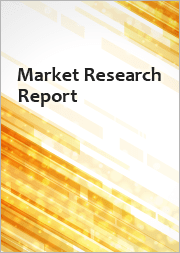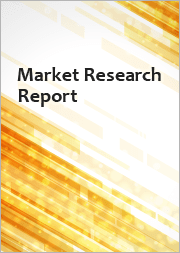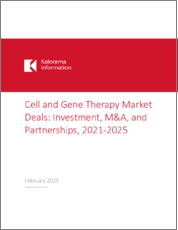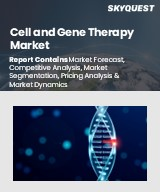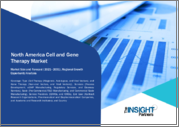
|
시장보고서
상품코드
1764840
북미의 세포 및 유전자 치료 시장 예측(-2031년) : 지역별 분석 - 유형별, 서비스 제공업체별, 규모별, 서비스 제공업체별, 최종사용자별North America Cell and Gene Therapy Market Forecast to 2031 - Regional Analysis - by Type, Services, Scale, Service Providers, and End User |
||||||
북미의 세포 및 유전자 치료제 시장은 2023년 21억 5,908만 달러로 평가되었습니다. 2031년에는 140억 4,906만 달러에 달하고, 2023-2031년 연평균 26.4%의 성장률을 보일 것으로 추정됩니다.
세포 및 유전자 치료제 승인 건수 증가로 북미의 세포 및 유전자 치료제 시장이 성장하고 있습니다.
생명공학 기술의 발전으로 다양한 적응증에 대한 개인 맞춤형 치료법이 도입되고 있습니다. 줄기세포 치료는 암, 신경질환, 유전성 질환, 기타 만성질환의 치료에 사용되고 있습니다. 또한, 세포치료의 장점으로는 표적화된 치료, 신속하고 효율적인 회복, 부작용 감소 등을 들 수 있습니다. 세포치료는 미국 식품의약국(FDA) 승인을 받은 제품이 출시되면서 전 세계적으로 널리 사용되고 있으며, 2024년 4월 FDA는 화이자가 중등도에서 중증의 혈우병 B형 혈우병 성인 환자 중 제9인자(FIX) 예방요법을 받고 있는 환자의 치료에 BEQVEZ를 사용하도록 승인했습니다. FIX 결핍은 희귀한 유전적 출혈성 질환인 혈우병 B 환자들에게 건강한 사람들에 비해 더 자주, 더 오래 출혈을 일으키게 합니다. 2023년, FDA는 생후 6개월 이상 콜라겐 VII형 알파 1쇄(COL7A1) 유전자에 돌연변이가 있는 생후 6개월 이상의 영양장애성 표피수포증 환자를 위한 상처 치료제로 크리스탈 바이오텍의 VYJUVEK을 승인했습니다. Ferring Pharmaceuticals A/S가 제조한 아데노바이러스 제제 ADSTILADRIN이 FDA의 승인을 받았습니다. 이 재조합 아데노바이러스(rAd-IFNa/Syn3)는 인간 인터페론 알파-2b cDNA를 방광 상피에 전달하여 일부 방광암 환자를 치료합니다.2023년 Janssen Biotech의 CARVYKTI(렌치바이러스로 조작된 자가 CAR-T 세포로 BCMA를 발현하는 종양 세포를 공격하여 재발성 또는 불응성 다발성 골수종 치료에 사용)도 FDA 승인을 받았으며, 2021년 3월에는 재발성 및 불응성 다발성 골수종에 대한 최초의 항 BCMA CAR T 세포 치료제인 Abecma(이데카부타젠비클루셀)가 2020년 4월, FDA는 노바티스의 킴리아(Kymriah)를 성인 난치성(r/r) 여포성 림프종(FL)의 치료제로서 재생의료 혁신 치료제 지정을 부여했습니다. 2020년 7월, FDA는 성인 난치성(r/r) 여포성 림프종(FL) 치료제로서 FDA는 맨틀세포 림프종 환자를 위한 CAR T세포 치료제 브렉수카브타진 오토루셀(Tecartus)을 승인했습니다. 이는 FDA가 맨틀세포 림프종에 대해 승인한 최초의 CAR T세포 치료제이며, 신속 승인 경로를 통해 승인된 최초의 CAR T세포 치료제입니다. 또한, Tecartus는 희귀질환 치료제 개발을 장려하는 희귀질환 치료제 지정도 받았습니다. 암에 대한 다른 CAR-T 세포 치료제로는 급성 림프모구백혈병에 대한 킴리아(Kymriah)와 미만성 거대 B세포 림프종에 대한 예스카르타(Yescarta)가 승인된 바 있습니다. 따라서 세포 및 유전자 치료제의 승인 건수 증가는 생산 능력을 증가시켜 북미의 세포 및 유전자 치료제 시장의 성장을 가속하고 있습니다.
북미의 세포 및 유전자 치료제 시장 개요
북미의 세포 및 유전자 치료 시장은 미국, 캐나다, 멕시코로 구분되며, 2023년 북미의 세포 및 유전자 치료 시장 점유율은 미국이 가장 클 것으로 예측됩니다. 미국 세포 및 유전자 치료제 시장의 성장은 줄기세포치료, 유전자치료, 면역치료 등 세포치료의 채택이 확대되고 있기 때문입니다. 유전성 질환과 세포성 질환 증가가 세포치료에 대한 수요 증가로 이어지고 있습니다. 미국 유전자 및 세포치료학회(ASGCT)에 따르면, 현재 전임상부터 예비등록까지 파이프라인에 있는 치료법은 3,633개이며, 이 중 55%가 유전자치료, 22%가 비유전자변형세포, 23%가 RNA치료입니다. 이들은 암, 유전성 질환, 신경질환 등 다양한 질환과 병태를 대상으로 하고 있으며, 2024년 2월 현재 미국에서는 19개의 세포 및 유전자 치료 제품이 암, 안과 질환, 희귀 유전성 질환의 치료제로 승인되었습니다. 또한, 미국에서는 세포치료제를 혁신하는 스타트업의 수가 증가하고 있습니다. 또한, 정부의 지원 증가는 세포치료제의 성장을 가속하고 시장 개척에 영향을 미치고 있습니다. 예를 들어, 공공 기관인 미국 유전자 및 세포치료학회(ASGCT)는 유전자 및 세포치료에 종사하는 과학자, 의사, 전문가, 환자 옹호자들에게 회원 자격을 제공하고 있으며, ASGCT는 세포 및 유전자 치료의 임상적 적용에 대한 지식, 교육 및 인식을 높이는 것을 목표로 하고 있습니다.
북미의 세포 및 유전자 치료제 시장 세분화
북미의 세포 및 유전자 치료 시장은 유형, 서비스, 규모, 최종 사용자, 국가별로 분류됩니다.
유형별로 북미의 세포 및 유전자 치료 시장은 세포 치료와 유전자 치료로 구분되며, 2023년에는 세포 치료 분야가 더 큰 시장 점유율을 차지할 것으로 예측됩니다. 또한, 세포 치료 부문은 동종, 자가, 바이러스 벡터로 세분화됩니다. 또한, 유전자 치료 부문은 비 바이러스 벡터와 바이러스 벡터로 나뉩니다.
서비스 측면에서 북미의 세포 및 유전자 치료 시장은 공정 개발, cGMP 제조, 규제 서비스, 바이오 분석 서비스로 분류되며, 2023년에는 공정 개발 분야가 가장 큰 시장 점유율을 차지할 것으로 예측됩니다.
규모별로는 북미의 세포 및 유전자 치료제 시장은 프리커머셜/R&D 제조와 상업적 규모의 제조로 구분되며, 2023년에는 프리커머셜/R&D 제조 부문이 더 큰 시장 점유율을 차지할 것으로 예측됩니다.
최종 사용자별로 북미의 세포 및 유전자 치료제 시장은 계약 연구 기관, 제약 및 바이오 제약 기업, 학술 및 연구 기관으로 구분되며, 2023년에는 계약 연구 기관 부문이 가장 큰 시장 점유율을 차지할 것으로 예측됩니다.
국가별로는 북미 세포-유전자 치료제 시장은 미국, 캐나다, 멕시코로 구분되며, 2023년 북미 세포-유전자 치료제 시장 점유율은 미국이 독보적이었습니다.
Catalent Inc., Charles River Laboratories International Inc. KGaA, Takara Bio Inc., Thermo Fisher Scientific Inc., WuXi AppTec Co Ltd. 등이 북미의 세포 및 유전자 치료제 시장에서 사업을 전개하는 주요 기업들입니다.
목차
제1장 서론
제2장 주요 요약
- 주요 인사이트
제3장 조사 방법
- 2차 조사
- 1차 조사
- 가설 책정
- 거시경제 요인 분석
- 파운데이션 수치 개발
- 데이터 삼각측량
- 국가 레벨 데이터
제4장 세포 및 유전자 치료 시장 구도
- PEST 분석
제5장 북미의 세포 및 유전자 치료 시장 : 주요 시장 역학
- 세포 및 유전자 치료 시장 : 주요 시장 역학
- 시장 성장 촉진요인
- 시장 성장 억제요인
- 시장 기회
- 향후 동향
- 성장 촉진요인과 억제요인의 영향
제6장 세포 및 유전자 치료 시장 : 북미 시장 분석
- 북미의 세포 및 유전자 치료 시장 개요
- 북미의 세포 및 유전자 치료 시장 매출, 2021년-2031년
- 북미의 세포 및 유전자 치료 시장 예측 분석
제7장 북미의 세포 및 유전자 치료 시장 분석 : 유형별
- 세포치료
- 유전자 치료
제8장 북미의 세포 및 유전자 치료 시장 분석 : 서비스별
- 프로세스 개발
- cGMP 제조
- 규제 서비스
- 바이오어세이 서비스
제9장 북미의 세포 및 유전자 치료 시장 분석 : 규모별
- 사전 상용/R&D 제조
- 상업 스케일 제조
제10장 북미의 세포 및 유전자 치료 시장 분석 : 서비스 제공업체별
- CDMO
- CMO
제11장 북미의 세포 및 유전자 치료 시장 분석 : 최종사용자별
- 계약 연구기관
- 제약 및 바이오 제약 기업
- 학술기관 및 연구기관
제12장 북미의 세포 및 유전자 치료 시장 : 국가별 분석
- 북미
- 미국
- 캐나다
- 멕시코
제13장 업계 상황
- 세포 및 유전자 치료 시장 성장 전략
- 유기적 성장 전략
- 무기적 성장 전략
제14장 기업 개요
- Thermo Fisher Scientific Inc.
- Merck KGaA
- Charles River Laboratories International Inc
- Lonza Group AG
- WuXi AppTec Co Ltd
- Takara Bio Inc
- FUJIFILM Holdings Corp
- F. Hoffmann-La Roche Ltd
- Catalent Inc
- Lotte Corp
제15장 부록
LSH 25.07.21The North America cell and gene therapy market was valued at US$ 2,159.08 million in 2023 and is projected to reach US$ 14,049.06 million by 2031; it is estimated to record a CAGR of 26.4% from 2023 to 2031.
Increase in Number of Approval of Cell and Gene Therapies Boosts North America Cell and Gene Therapy Market
The advancements in biotechnology have led to the adoption of personalized treatments for a wide range of indications. Stem cell therapies are being used to treat cancer, neurological disorders, genetic disorders, and other chronic diseases. Further, the advantages of cell therapy include targeted treatment, rapid and efficient recovery, and reduced side effects. Cell therapies are widely adopted worldwide owing to the availability of Food and Drug Administration (FDA) approved products. A few of the cell and gene therapy products approved by the FDA in recent years are mentioned; In April 2024, the FDA approved BEQVEZ for use by Pfizer Inc. to treat adults suffering from moderate to severe hemophilia B who are on factor IX (FIX) prophylaxis therapy. A FIX deficiency causes people with hemophilia B, a rare genetic bleeding illness, to bleed more frequently and for longer periods than healthy people. The disease hinders normal blood clotting. In 2023, the FDA approved VYJUVEK, manufactured by Krystal Biotech, Inc., for the treatment of wounds in patients ages 6 months and above with dystrophic epidermolysis bullosa, showing mutation(s) in the collagen type VII alpha 1 chain (COL7A1) gene. In 2023, ADSTILADRIN, an adenovirus manufactured by Ferring Pharmaceuticals A/S, was approved by the FDA. This recombinant adenovirus (rAd-IFNa/Syn3) delivers human interferon alfa-2b cDNA into the bladder epithelium to treat patients with certain types of bladder cancer. In 2023, CARVYKTI, manufactured by Janssen Biotech, Inc.-an autologous CAR-T cell engineered with lentivirus to attack BCMA-expressing tumor cells for the treatment of certain kinds of relapsed or refractory multiple myeloma-was also approved by the FDA. In 2023, the FDA approved HEMGENIX, manufactured by CSL Behring LLC, which is a recombinant AAV5 that delivers F9 to treat patients with certain kinds of Hemophilia B. In March 2021, the first anti-BCMA CAR T cell therapy for relapsed or resistant multiple myeloma, called Abecma (idecabtagene vicleucel), has been approved by the US FDA for use by Bristol Myers Squibb and Bluebird Bio. In April 2020, the FDA awarded regenerative medicine advanced therapy designation to Novartis' Kymriah to treat refractory (r/r) follicular lymphoma (FL) in adults. In July 2020, the FDA approved a CAR T-cell therapy brexucabtagene autoleucel (Tecartus) for patients with mantle cell lymphoma. It is the first FDA-approved CAR T-cell therapy for mantle cell lymphoma, and it was approved under the accelerated approval pathway. Tecartus also received Orphan Drug designation, which encourages the development of drugs for rare diseases. The other approved CAR-T cell therapies for cancer are Kymriah for acute lymphoblastic leukemia and Yescarta for diffuse large B-cell lymphoma. Therefore, the increasing number of approvals of cell and gene therapies enhances manufacturing capabilities, which fuels the North America cell and gene therapy market growth.
North America Cell and Gene Therapy Market Overview
The cell and gene therapy market in North America is segmented into the US, Canada, and Mexico. The US held the largest North American cell and gene therapy market share in 2023. The cell and gene therapies market growth in the US is attributed the growing adoption of cell therapies such as stem cell, gene, and immune therapies. Growing incidences of genetic and cellular disorders are leading to increasing demand for cell therapies. According to the American Society of Gene & Cell Therapy (ASGCT), there are currently 3,633 therapies in the pipeline-55% are gene, 22% are non-genetically modified cells, and 23% are RNA-from preclinical through pre-registration. These are focused on various diseases and conditions varying from cancer to genetic disorders to neurological conditions. As of February 2024, 19 cell and gene therapy products have been approved in the US for treating cancer, eye diseases, and rare hereditary diseases. Also, the country is experiencing an increasing number of start-ups innovating cell therapies. In addition, growing support from the government is promoting the growth of cell therapies, influencing the development of the market. For instance, the American Society of Gene & Cell Therapy (ASGCT), a public organization, offers memberships to scientists, physicians, professionals, and patient advocates who are engaged in gene and cell therapies. ASGCT aims to enhance knowledge, education, and awareness regarding the clinical application of cell and gene therapies.
North America Cell and Gene Therapy Market Revenue and Forecast to 2031 (US$ Million)
North America Cell and Gene Therapy Market Segmentation
The North America cell and gene therapy market is categorized into type, services, scale, end user, and country.
Based on type, the North America cell and gene therapy market is bifurcated into cell therapy and gene therapy. The cell therapy segment held a larger market share in 2023. Furthermore, the cell therapy segment is sub segmented into allogeneic, autologous, viral vectors. Additionally, the gene therapy segment is divided into non-viral vectors and viral vectors.
In terms of services, the North America cell and gene therapy market is categorized process development, cGMP manufacturing, regulatory services, and bioassay services. The process development segment held the largest market share in 2023.
By scale, the North America cell and gene therapy market is bifurcated into pre-commercial/R&D manufacturing and commercial scale manufacturing. The pre-commercial/R&D manufacturing segment held a larger market share in 2023.
Based on end user, the North America cell and gene therapy market is segmented into contract research organizations, pharmaceutical and biopharmaceutical companies, and academic and research institutes. The contract research organizations segment held the largest market share in 2023.
By country, the North America cell and gene therapy market is segmented into the US, Canada, and Mexico. The US dominated the North America cell and gene therapy market share in 2023.
Catalent Inc., Charles River Laboratories International Inc., F. Hoffmann-La Roche Ltd, FUJIFILM Holdings Corp, Lonza Group AG, Lotte Corp, Merck KGaA, Takara Bio Inc, Thermo Fisher Scientific Inc., and WuXi AppTec Co Ltd are some of the leading companies operating in the North America cell and gene therapy market.
Table Of Contents
1. Introduction
- 1.1 The Insight Partners Research Report Guidance
- 1.2 Market Segmentation
2. Executive Summary
- 2.1 Key Insights
3. Research Methodology
- 3.1 Secondary Research
- 3.2 Primary Research
- 3.2.1 Hypothesis formulation:
- 3.2.2 Macro-economic factor analysis:
- 3.2.3 Developing base number:
- 3.2.4 Data Triangulation:
- 3.2.5 Country level data:
4. Cell and Gene Therapy Market Landscape
- 4.1 Overview
- 4.2 PEST Analysis
5. North America Cell and Gene Therapy Market - Key Market Dynamics
- 5.1 Cell and Gene Therapy Market - Key Market Dynamics
- 5.2 Market Drivers
- 5.2.1 Increase in Number of Approval of Cell and Gene Therapies
- 5.2.2 Rapid Popularity of Outsourcing Cell and Gene Therapy Manufacturing
- 5.3 Market Restraints
- 5.3.1 High Cost of Cell and Gene Therapy Manufacturing
- 5.4 Market Opportunities
- 5.4.1 Strategic Initiatives by Companies
- 5.5 Future Trends
- 5.5.1 Automation of Cell and Gene Therapy Manufacturing Services
- 5.6 Impact of Drivers and Restraints:
6. Cell and Gene Therapy Market -North America Market Analysis
- 6.1 North America Cell and Gene Therapy Market Overview
- 6.2 North America Cell and Gene Therapy Market Revenue (US$ Million), 2021-2031
- 6.3 North America Cell and Gene Therapy Market Forecast Analysis
7. North America Cell and Gene Therapy Market Analysis - by Type
- 7.1 Cell Therapy
- 7.1.1 Overview
- 7.1.2 Cell Therapy: Cell and Gene Therapy Market - Revenue and Forecast to 2031 (US$ Million)
- 7.2 Gene Therapy
- 7.2.1 Overview
- 7.2.2 Gene Therapy: Cell and Gene Therapy Market - Revenue and Forecast to 2031 (US$ Million)
8. North America Cell and Gene Therapy Market Analysis - by Services
- 8.1 Process Development
- 8.1.1 Overview
- 8.1.2 Process Development: Cell and Gene Therapy Market - Revenue and Forecast to 2031 (US$ Million)
- 8.2 cGMP Manufacturing
- 8.2.1 Overview
- 8.2.2 cGMP Manufacturing: Cell and Gene Therapy Market - Revenue and Forecast to 2031 (US$ Million)
- 8.3 Regulatory Services
- 8.3.1 Overview
- 8.3.2 Regulatory Services: Cell and Gene Therapy Market - Revenue and Forecast to 2031 (US$ Million)
- 8.4 Bioassay Services
- 8.4.1 Overview
- 8.4.2 Bioassay Services: Cell and Gene Therapy Market - Revenue and Forecast to 2031 (US$ Million)
9. North America Cell and Gene Therapy Market Analysis - by Scale
- 9.1 Pre-Commercial/R&D Manufacturing
- 9.1.1 Overview
- 9.1.2 Pre-Commercial/R&D Manufacturing: Cell and Gene Therapy Market - Revenue and Forecast to 2031 (US$ Million)
- 9.2 Commercial Scale Manufacturing
- 9.2.1 Overview
- 9.2.2 Commercial Scale Manufacturing: Cell and Gene Therapy Market - Revenue and Forecast to 2031 (US$ Million)
10. North America Cell and Gene Therapy Market Analysis - by Service Providers
- 10.1 CDMOs
- 10.1.1 Overview
- 10.1.2 CDMOs: Cell and Gene Therapy Market - Revenue and Forecast to 2031 (US$ Million)
- 10.2 CMOs
- 10.2.1 Overview
- 10.2.2 CMOs: Cell and Gene Therapy Market - Revenue and Forecast to 2031 (US$ Million)
11. North America Cell and Gene Therapy Market Analysis - by End User
- 11.1 Contract Research Organizations
- 11.1.1 Overview
- 11.1.2 Contract Research Organizations: Cell and Gene Therapy Market - Revenue and Forecast to 2031 (US$ Million)
- 11.2 Pharmaceutical and Biopharmaceutical Companies
- 11.2.1 Overview
- 11.2.2 Pharmaceutical and Biopharmaceutical Companies: Cell and Gene Therapy Market - Revenue and Forecast to 2031 (US$ Million)
- 11.3 Academic and Research Institutes
- 11.3.1 Overview
- 11.3.2 Academic and Research Institutes: Cell and Gene Therapy Market - Revenue and Forecast to 2031 (US$ Million)
12. North America Cell and Gene Therapy Market - Country Analysis
- 12.1 North America Cell and Gene Therapy Market Overview
- 12.1.1 North America Cell and Gene Therapy Market, by Key Country - Revenue (2023) (US$ Million)
- 12.1.2 North America Cell and Gene Therapy Market - Revenue and Forecast Analysis - by Country
- 12.1.2.1 North America: Cell and Gene Therapy Market - Revenue and Forecast Analysis - by Country
- 12.1.2.2 United States: Cell and Gene Therapy Market - Revenue and Forecast to 2031 (US$ Million)
- 12.1.2.2.1 United States: Cell and Gene Therapy Market Breakdown, by Type
- 12.1.2.2.1.1 United States: Cell and Gene Therapy Market Breakdown, by Cell Therapy
- 12.1.2.2.1.2 United States: Cell and Gene Therapy Market Breakdown, by Gene Therapy
- 12.1.2.2.2 United States: Cell and Gene Therapy Market Breakdown, by Services
- 12.1.2.2.3 United States: Cell and Gene Therapy Market Breakdown, by Scale
- 12.1.2.2.4 United States: Cell and Gene Therapy Market Breakdown, by Service Providers
- 12.1.2.2.5 United States: Cell and Gene Therapy Market Breakdown, by End User
- 12.1.2.2.1 United States: Cell and Gene Therapy Market Breakdown, by Type
- 12.1.2.3 Canada: Cell and Gene Therapy Market - Revenue and Forecast to 2031 (US$ Million)
- 12.1.2.3.1 Canada: Cell and Gene Therapy Market Breakdown, by Type
- 12.1.2.3.1.1 Canada: Cell and Gene Therapy Market Breakdown, by Cell Therapy
- 12.1.2.3.1.2 Canada: Cell and Gene Therapy Market Breakdown, by Gene Therapy
- 12.1.2.3.2 Canada: Cell and Gene Therapy Market Breakdown, by Services
- 12.1.2.3.3 Canada: Cell and Gene Therapy Market Breakdown, by Scale
- 12.1.2.3.4 Canada: Cell and Gene Therapy Market Breakdown, by Service Providers
- 12.1.2.3.5 Canada: Cell and Gene Therapy Market Breakdown, by End User
- 12.1.2.3.1 Canada: Cell and Gene Therapy Market Breakdown, by Type
- 12.1.2.4 Mexico: Cell and Gene Therapy Market - Revenue and Forecast to 2031 (US$ Million)
- 12.1.2.4.1 Mexico: Cell and Gene Therapy Market Breakdown, by Type
- 12.1.2.4.1.1 Mexico: Cell and Gene Therapy Market Breakdown, by Cell Therapy
- 12.1.2.4.1.2 Mexico: Cell and Gene Therapy Market Breakdown, by Gene Therapy
- 12.1.2.4.2 Mexico: Cell and Gene Therapy Market Breakdown, by Services
- 12.1.2.4.3 Mexico: Cell and Gene Therapy Market Breakdown, by Scale
- 12.1.2.4.4 Mexico: Cell and Gene Therapy Market Breakdown, by Service Providers
- 12.1.2.4.5 Mexico: Cell and Gene Therapy Market Breakdown, by End User
- 12.1.2.4.1 Mexico: Cell and Gene Therapy Market Breakdown, by Type
13. Industry Landscape
- 13.1 Overview
- 13.2 Growth Strategies in Cell and Gene Therapy Market
- 13.3 Organic Growth Strategies
- 13.3.1 Overview
- 13.4 Inorganic Growth Strategies
- 13.4.1 Overview
14. Company Profiles
- 14.1 Thermo Fisher Scientific Inc.
- 14.1.1 Key Facts
- 14.1.2 Business Description
- 14.1.3 Products and Services
- 14.1.4 Financial Overview
- 14.1.5 SWOT Analysis
- 14.1.6 Key Developments
- 14.2 Merck KGaA
- 14.2.1 Key Facts
- 14.2.2 Business Description
- 14.2.3 Products and Services
- 14.2.4 Financial Overview
- 14.2.5 SWOT Analysis
- 14.2.6 Key Developments
- 14.3 Charles River Laboratories International Inc
- 14.3.1 Key Facts
- 14.3.2 Business Description
- 14.3.3 Products and Services
- 14.3.4 Financial Overview
- 14.3.5 SWOT Analysis
- 14.3.6 Key Developments
- 14.4 Lonza Group AG
- 14.4.1 Key Facts
- 14.4.2 Business Description
- 14.4.3 Products and Services
- 14.4.4 Financial Overview
- 14.4.5 SWOT Analysis
- 14.4.6 Key Developments
- 14.5 WuXi AppTec Co Ltd
- 14.5.1 Key Facts
- 14.5.2 Business Description
- 14.5.3 Products and Services
- 14.5.4 Financial Overview
- 14.5.5 SWOT Analysis
- 14.5.6 Key Developments
- 14.6 Takara Bio Inc
- 14.6.1 Key Facts
- 14.6.2 Business Description
- 14.6.3 Products and Services
- 14.6.4 Financial Overview
- 14.6.5 SWOT Analysis
- 14.6.6 Key Developments
- 14.7 FUJIFILM Holdings Corp
- 14.7.1 Key Facts
- 14.7.2 Business Description
- 14.7.3 Products and Services
- 14.7.4 Financial Overview
- 14.7.5 SWOT Analysis
- 14.7.6 Key Developments
- 14.8 F. Hoffmann-La Roche Ltd
- 14.8.1 Key Facts
- 14.8.2 Business Description
- 14.8.3 Products and Services
- 14.8.4 Financial Overview
- 14.8.5 SWOT Analysis
- 14.8.6 Key Developments
- 14.9 Catalent Inc
- 14.9.1 Key Facts
- 14.9.2 Business Description
- 14.9.3 Products and Services
- 14.9.4 Financial Overview
- 14.9.5 SWOT Analysis
- 14.9.6 Key Developments
- 14.10 Lotte Corp
- 14.10.1 Key Facts
- 14.10.2 Business Description
- 14.10.3 Products and Services
- 14.10.4 Financial Overview
- 14.10.5 SWOT Analysis
- 14.10.6 Key Developments
15. Appendix
- 15.1 About The Insight Partners
- 15.2 Glossary of Terms






